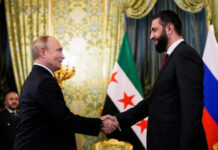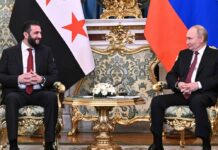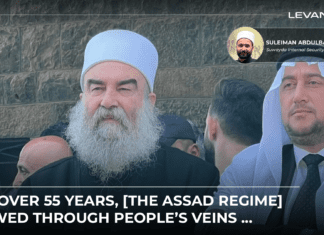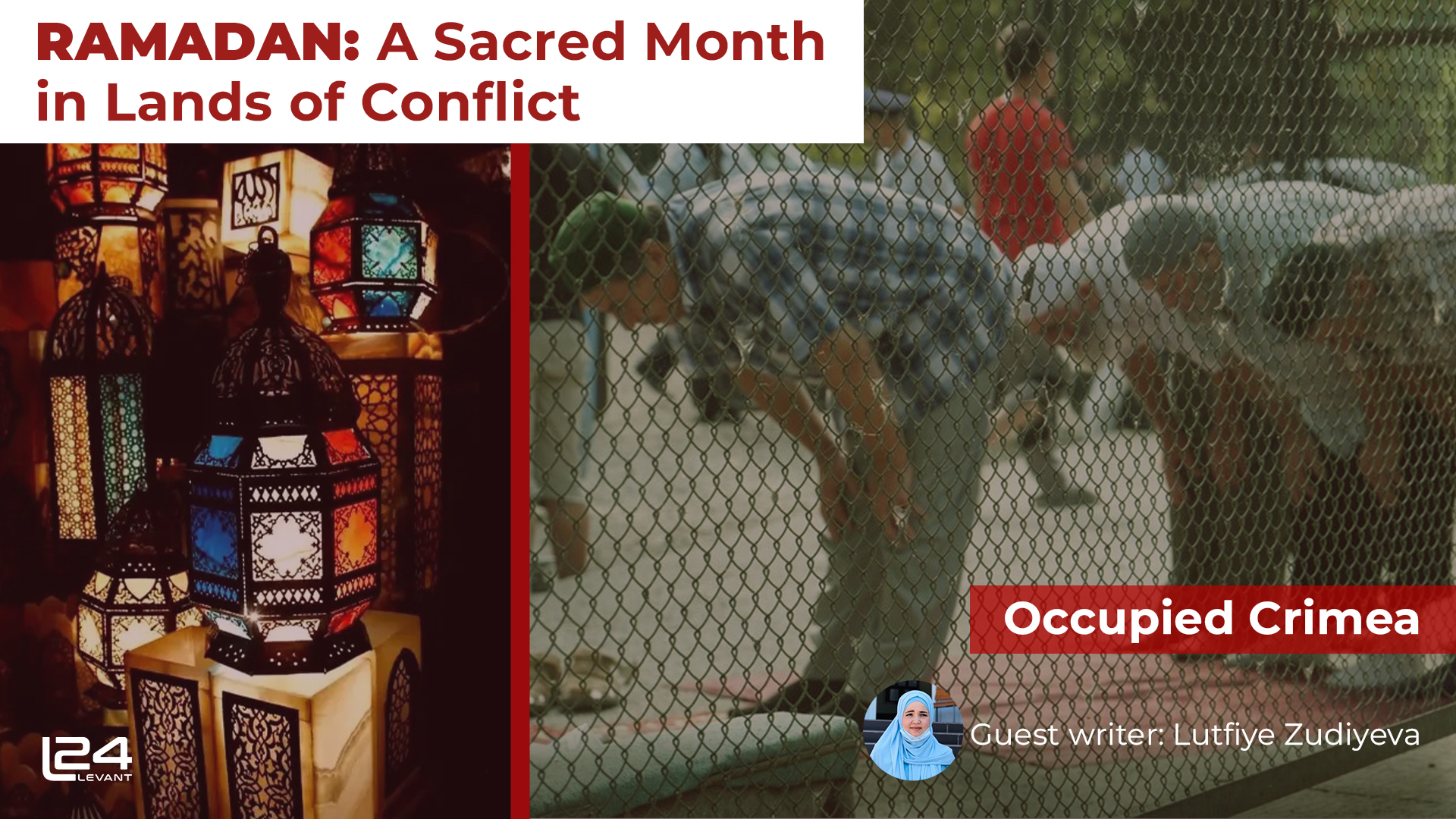
Levant 24 is honored to have journalist and human rights defender Lutfiye Zudiyeva, a Crimean Tatar, write an article about the situation of the Tartar Muslims in Russia-occupied Crimea. Zudiyeva is a member of the human rights movement Crimean Solidarity which monitors politically-motivated trials in Russian-occupied Crimea and supports political prisoners and their families. She also works as a journalist and author who was recently published in issue 47 of Critical Muslim. Zudiyeva has suffered for her activism under the occupation forces in Crimea, which have detained her three times and twice sentenced her to pay administrative fines. She currently faces two more court hearings this Ramadan, on March 20, 2024.
______________________________
Our people became a minority in our own homeland as a result of genocide after the deportation in 1944 and they do not feel safe from the Russian authorities even today. Raids on homes and mosques, intimidation, various types of pressure, administrative fines, arrests of activists, and attacks on public religious figures — all this has become commonplace in Crimea.
I want to tell you about the case of Yusuf Ashirov, Imam of the mosque Yukari Jami. He had been accused of carrying out “missionary activities” in violation of the requirements of the legislation of the Russian Federation. In November 2023, the Imam was deliberately detained on Thursday, to not let him go to prayer on Friday. Then security forces brought another imam, which caused discontent among parishioners. Imam Yusuf Ashirov thinks that the base of his case is a “raider seizure of a mosque.”
“I was removed by force. People with machine guns and in bulletproof vests came and then imprisoned me for two days to remove me,” Ashirov commented. On 23 November the Alushta City Court sentenced Ashirov to two days in prison. The police said he had allegedly used bad words, which he denied, and filed a report on him for petty hooliganism.
This isn’t the first time the Alushta Muslim community is under pressure. Some of her members have already been arrested, enduring long periods of imprisonment, and transferred from Crimea to Russia. Ashirov was fined twice for “illegal missionary activity” while the community was fined for “unmarked missionary activity.” There were searches in the mosque more than once. Local people disagreed with this and urgently demanded that Ashirov continue to lead prayers and conduct Muslim prayers and rituals.

Defender Rustem Kamilyov noted that Ashirov has been working from the moment of the community’s foundation. Since 1995 he has repeatedly been elected by local people there. After 2014 the community in Alushta was re-registered and remained autonomous. While Ashirov was detained for two days, dozens of other Muslims are being sentenced to between 15 and 20 years in prison.
For the last 10 years, the list of political prisoners in Crimea has increased to more than 220 people. The majority consists of 135 Crimean Tatars, Muslims. They are teachers, doctors, journalists, human rights activists, IT engineers, and others. More than half of the political prisoners are in their fifties and sixties, with several in terrible health. The terms of imprisonment that Russian courts hand down are indeed death sentences.
Moreover, Russian security services have arrested several disabled people, among whom there was a blind man. He is unreasonably accused of terrorism. Only because he is a Muslim with his own alternative views on life. The Crimean Tatars imprisoned and sentenced to lengthy terms under Russian legislation, on “terrorism” and “extremism” charges have nothing to do with terrorism and state this publicly in court. They only express their civic, political, and religious views solely through non-violent means, without any crime.
In my opinion, by initiating criminal prosecutions against Muslim Crimean Tatars and fabricating a non-existent terrorist threat, Russia is also trying to convince the international community that its presence in Crimea is justified.
Families Under Attack
Almost 253 underage children are deprived of a normal childhood in an extended family and are raised without their fathers. Many of them witnessed the searches, saw dozens of armed people, and endured strong psychological stress. We have documented cases of severe illnesses of the children, which are the results of the searches.
In some villages, which are mostly inhabited by Crimean Tatars, so called “women’s streets” have appeared. The men of those homes have been detained and arrested after the searches. Despite these ordeals, they don’t weaken. Most of them lead media campaigns to protect and advocate for their husbands, they become activists and help one another. Due to this, wives and mothers are subject to administrative proceedings and fines.
Over several years, we have buried more than 15 fathers and mothers, all of whom did not have a chance to see their children’s return from prison. Instead of their sons, they are buried by friends and neighbors. An imprisoned Crimean Tatar, Vadim Bektemirov’s father, Zaidin Bektemirov died from a heart attack, alone in the field, working the pasture, just 10 days after the raid and abduction of his son.
Vadim Bektemirov, a master’s student majoring in Islamic teachings at the Faculty of Arabic Literature and Humanities, who, before his arrest, actively supported the families of political prisoners, attended court hearings, and organized parcels for the arrested Crimean Tatars.
There are families where several members are arrested at once. The father, brother and husband of the Crimean Tatar woman Fatma Ismailova were arrested and sentenced to terms from 13 to 19 years in prison. Dilara Abdullayeva’s two sons, Uzeyir and Teymur, were sentenced to the same lengthy terms.
Uzeyir and Teymur had won the European Taekwondo Championship and also became the winners of the Ukrainian Championship. In recent years, before their arrest, the pair trained youth in their gym in the village of Stroganovka. They lived in the neighborhood; both were fathers with many children: Uzeyir is the father of four children and his brother Teymur has five.
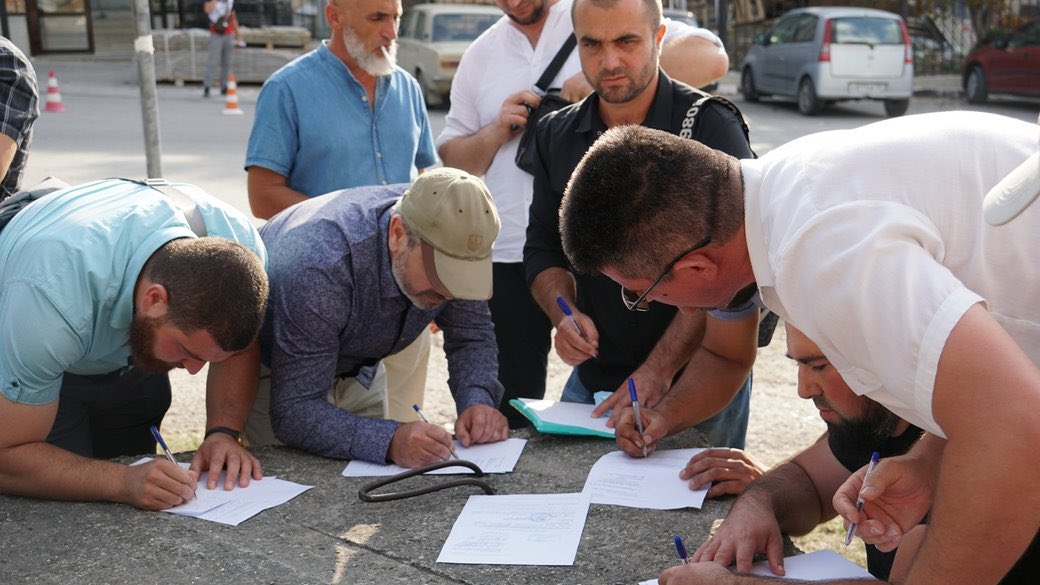
For the family of the Crimean Tatar woman Fatima Yanikova, March 27, 2019 became the black date of the calendar. After the searches, officers of the Federal Security Service (FSB) arrested her husband Farhod Bazarov, and her brother Asan Yanikov, as well as her husband’s brother Alim Kerimov.
Crimean political prisoners have great difficulties with fasting in the month of Ramadan month, because there is pork in the prison food, they cannot eat the predawn meal in the morning (suhoor) or break the fast for iftar (sunset meal) nor recite Tarawih (voluntary night prayers read in Ramadan) due to prison restrictions. And they are not allowed to hold the obligatory Friday congregational prayer.
Thus, for example, political prisoner Muslim Uzeyir Abdullayev was given 10 days in a pretrial detention center for violation of the prison rules:
As told by his wife Fera Abdullaeva, “He woke up at night to eat (he fasts because of religious reasons, and he must eat before dawn). He was also given an additional five days in a pretrial detention center for ‘sleeping at the wrong time.’ In this way they let him know: that the administration wants him to not fast in accordance with their orders”
The wife of another political prisoner, Crimean Tatar journalist Remzi Bekirov, said that he had to take the suhoor in bed because it is prohibited to be out of bed from 10 pm until 6 am, which is considered a violation of the rules. So he has to bring the food with him in the evening and eat at night, “Provided the prison food, which is not always acceptable for Muslims to eat, is available, his wife explained, “They remove potatoes from the meals served in prison, wash them (to remove any impermissible things like pork) and they eat.” While the Crimean Muslims are all being held in different Russian prisons, they all face similar problems, because the penitentiary system does not take into account the religious restrictions and obligations of the prisoners.
Even the Mosques are Occupied
Before the 2014 invasion and occupation, none of the Muslim groups or organizations (which are prohibited and prosecuted in Russia) were recognized as terrorist or extremist organizations in Crimea. No groups were persecuted by the state of Ukraine. Religious and Islamic literature was freely available and studied at the individual discretion of the person under Ukrainian law.
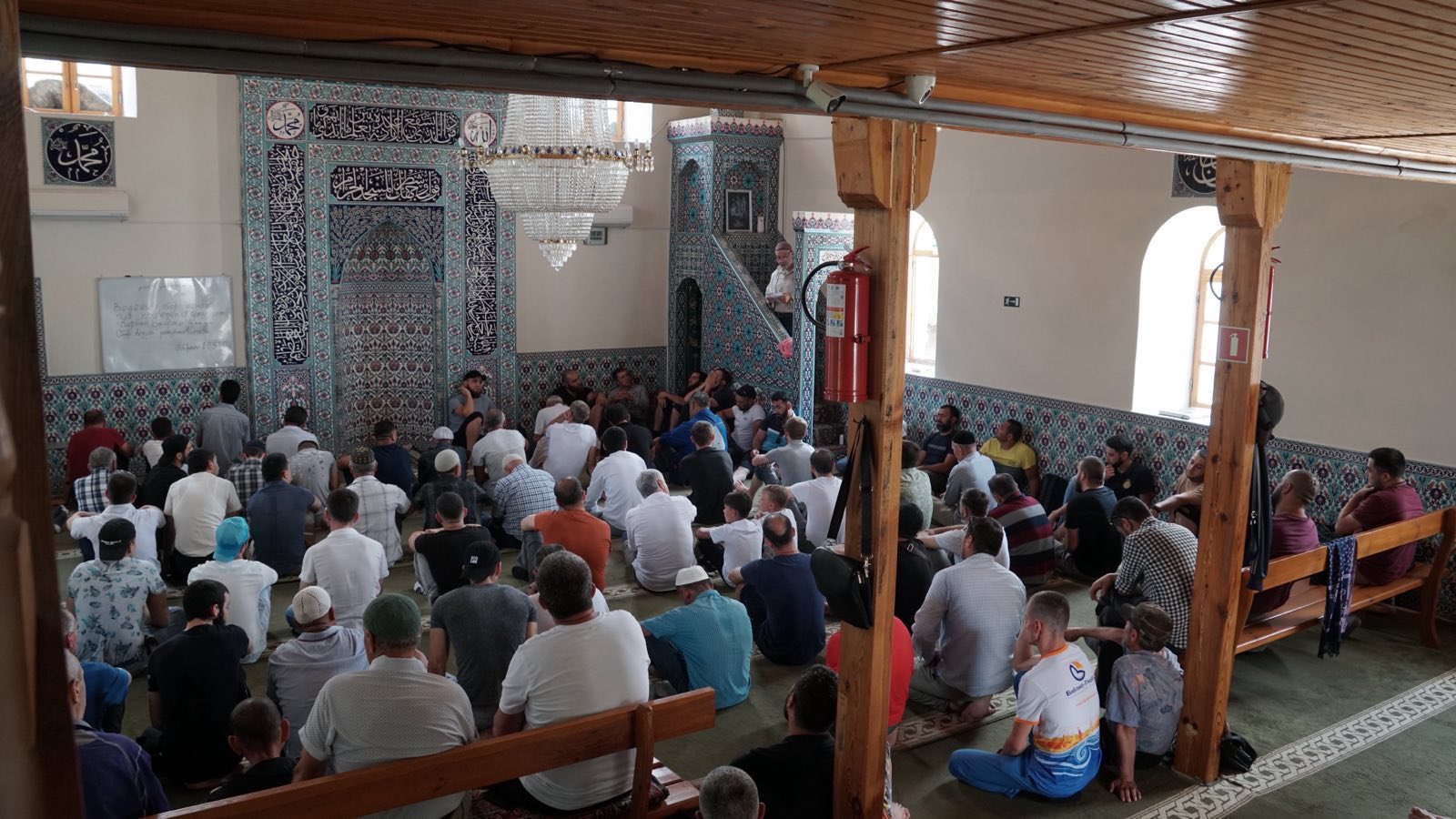
But now, Russian authorities have created an absolute monopoly on the religious lives of Muslims. They force everyone who disagrees with them out of the mosques and create laws to control or outlaw various organizations, which are enforced by the Russian executive and judicial branches. The ownership of mosques is transferred exclusively to the local occupation authorities. Thereby creating a framework of “justification” for the prosecution of people, who during the previous (preoccupation) years, performed religious ceremonies, including observance of Islamic holidays and iftars (communal meals in Ramadan for breaking the fast.)
Now, there are raids on these buildings, Imams and community chairmen are detained, they have to pay fines, and are victims of administrative arrests. People, who are controlled by occupying authorities, take their place. Several criminal cases against Muslims have been opened based on hidden audio recordings in mosques in different Crimean districts. This practice creates an atmosphere of distrust and fear.
Today the main issue of Crimean Muslims is creation of restrictive conditions, that make the very existence of religious leadership not appointed by Russia a crime. Thus the religious and community leadership that existed for years prior – all become “lawbreakers” overnight under the new occupation laws.
This exemplifies how the Kremlin, despite statements about the “rehabilitation of repressed peoples” and “respecting rights of Muslims” still exercises the long-term persecution of Muslim people in their territory, including the Crimean Tatar people.
A huge mosque is now being built (by the occupation) on the peninsula, in an area with a high population density of Crimean Tatars, kindergartens and schools are being built and opened there. This is a propaganda campaign, claiming to be for promoting the “social well-being” of Crimean Tatars after the 2014 invasion of Crimea. In the town of Bakhchysarai a huge beautiful preschool was built for the children in the sixth microdistrict. Yet at the same time, as a result of four waves of mass raids in Bakhchysarai, 31 fathers were taken away from 85 children on the trumped-up charges of “terrorism.” I think it is useless to ask these children – what is more essential for them – their fathers or a new school? The answer is obvious.
A History of Persecution and Perseverance
Crimean Muslims tried to fast even during the 1944 deportations, when they were loaded in freight cars and shipped from Crimea to Central Asia. My grandmother said that communists had carefully observed them, not to let anybody fast, but people had secretly observed their Islamic rituals. They woke up for suhoor, covered the windows with thick blankets to not let light escape from the window, so the commandants could not find out who was fasting during Ramadan. They were forced to pick cotton in fields, lined up, and given food and drink to try to discover who fasts. When all the inspectors left, fasting Muslims induced vomiting, so that food would not remain in their stomachs, rinsed their mouths with water, and renewed their intention and fast.

This love of their religion and culture remained after returning to home, to Crimea. Before 2014 Ukraine did not persecute the Muslims for their religious views, although its special services certainly monitored all organizations. In Crimea, before the Russian invasion. Mosques which had been destroyed en masse during the Soviet era, were rebuilt.
Despite the repression, people continue to study religion, observe congregational prayers and support the families of the Crimean Tatar Muslim prisoners. I think that pressure, contrary to destroying them, instead brings together and unites Crimean Tatar people.
Allah Almighty teaches us in the Quran that “… Indeed, Allah will not change the condition of a people until they change what is in themselves” (Quran;13:11). Allah has given us every opportunity for change. This requires diligence, systematic work and faith in the help of the Almighty. We should not wait for someone to change the situation and solve problems for us. No, it’s our responsibility.

